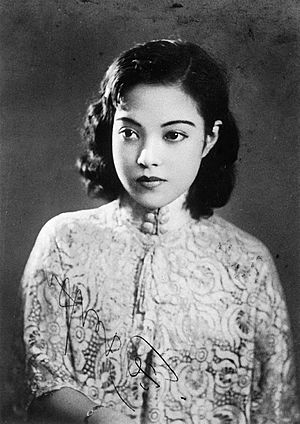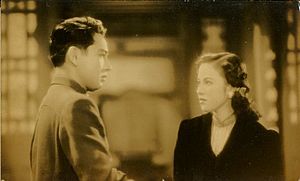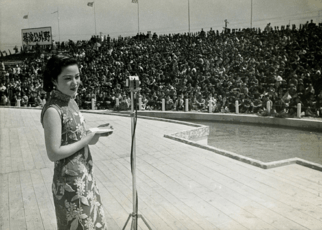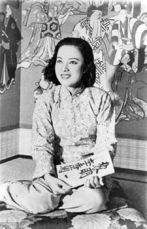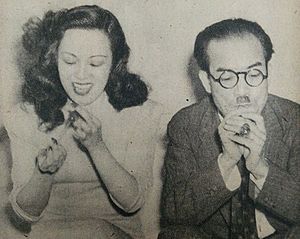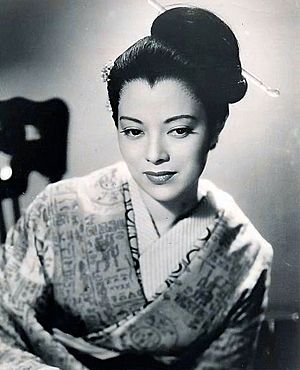Yoshiko Yamaguchi facts for kids
Quick facts for kids
Yoshiko Yamaguchi
|
|||||||||||||
|---|---|---|---|---|---|---|---|---|---|---|---|---|---|
|
山口 淑子
|
|||||||||||||
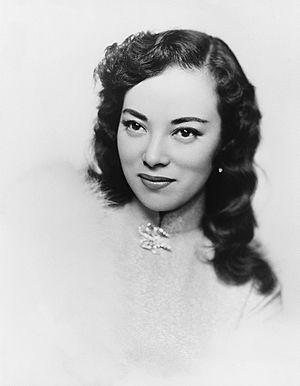
Yamaguchi in the 1940s
|
|||||||||||||
| Member of the House of Councillors | |||||||||||||
| In office 8 July 1974 – 7 July 1992 |
|||||||||||||
| Constituency | National district (1974-83) National PR (1983-1992) |
||||||||||||
| Personal details | |||||||||||||
| Born |
Yoshiko Yamaguchi
February 12, 1920 Liaoyang, Manchuria, Republic of China |
||||||||||||
| Died | September 7, 2014 (aged 94) Tokyo, Japan |
||||||||||||
| Political party | Liberal Democratic Party | ||||||||||||
| Spouses |
Hiroshi Otaka
(m. 1958; died 2001) |
||||||||||||
| Parents | Ai Yamaguchi (mother) Fumio Yamaguchi (father) |
||||||||||||
| Occupation | Singer, actress, journalist, politician | ||||||||||||
| Awards | Order of the Sacred Treasure, Second Class | ||||||||||||
| Musical career | |||||||||||||
| Also known as | Yoshiko Ōtaka (大鷹 淑子) Pan Shuhua (潘淑華) Shirley Yamaguchi Li Hsiang-lan (李香蘭) |
||||||||||||
| Genres | Popular music | ||||||||||||
| Years active | 1938–1958 | ||||||||||||
| Chinese name | |||||||||||||
| Traditional Chinese | 李香蘭 | ||||||||||||
| Simplified Chinese | 李香兰 | ||||||||||||
|
|||||||||||||
Yoshiko Yamaguchi (山口 淑子 (Yamaguchi Yoshiko, February 12, 1920 – September 7, 2014)) was a famous Japanese singer, actress, journalist, and politician. She was born in China and had a successful career in movies in China, Hong Kong, Japan, and the United States.
Early in her career, she used the Chinese name Li Hsiang-lan (李香蘭), known in Japanese as Ri Kōran. This helped her appear Chinese in Japanese films, some of which were used for propaganda. After World War II, she used her real name in Japanese movies. She also acted in English movies under the name Shirley Yamaguchi.
In the 1950s, she became a journalist, using the name Yoshiko Ōtaka (大鷹 淑子, Ōtaka Yoshiko). Later, in 1974, she was elected to the Japanese parliament and served for 18 years. After leaving politics, she became a leader at the Asian Women's Fund.
Early Life and Education
Yoshiko Yamaguchi was born on February 12, 1920. Her parents, Ai Yamaguchi and Fumio Yamaguchi, were Japanese settlers living in Fushun, Manchuria, which was part of the Republic of China at the time. Her father worked for the South Manchuria Railway.
From a young age, Yoshiko learned to speak Mandarin Chinese. Her father had important Chinese friends, including Li Jichun and Pan Yugui. Following Chinese tradition, these friends became her "godfathers" and gave her two Chinese names: Li Hsiang-lan and Pan Shuhua. Yoshiko later used Li Hsiang-lan as her stage name.
When she was young, Yoshiko had tuberculosis. To help her breathing, a doctor suggested voice lessons. She preferred Western music and learned to sing from an Italian opera singer. She also went to school in Beijing, where she improved her Mandarin while staying with the Pan family. She became a talented singer, known as a coloratura soprano.
Film Career in China
Yoshiko started her acting and singing career in 1938 in the film Honeymoon Express. She was known as Li Hsiang-lan. The film company wanted a Manchurian girl who could speak both Japanese and Chinese. This helped her become a big star and a "Japan-Manchuria Goodwill Ambassadress."
The head of the Manchukuo film industry saw her talent. He wanted a beautiful actress who spoke both Mandarin and Japanese, could appear Chinese, and had a great singing voice. Chinese actors in these films did not know she was Japanese. They suspected she was partly Japanese because she ate with Japanese actors and was paid much more.
Many of her films promoted Japanese policies, especially the idea of a "Greater East Asia Co-prosperity Sphere." One controversial film was China Nights (1940). In this movie, Li played a Chinese woman who disliked Japanese people but fell in love with a Japanese man. Chinese audiences did not like this film, feeling it made Chinese women look bad.
After the war, one of her famous songs, "Suzhou Serenade," was banned in China because of its link to this film. Later, she apologized for her role in these films, saying she was young and inexperienced. Her Japanese identity was not widely known in China until after the war.
By the 1940s, she became one of the Seven Great Singing Stars in China. Her songs, with their jazz and pop styles, made her one of the top singers in Chinese-speaking areas. Many of her songs from this time became classics, like "Evening Primrose" and "Second Dream."
- As Li Hsiang-lan in Japan
-
Visit to Japan. Concert in Nishinomiya (1939)
Career in the United States, Hong Kong, and Japan
After World War II, Li was arrested in Shanghai. She was accused of working with the Japanese. However, her parents proved she was Japanese, not Chinese. This meant she could not be charged with treason. She was told to leave China.
In 1946, she moved back to Japan and started a new acting career as Yoshiko Yamaguchi. She worked with famous directors like Akira Kurosawa. Many of her post-war films explored her experience of being bilingual and bicultural. For example, in Woman of Shanghai (1952), she played a Japanese woman pretending to be Chinese.
In the 1950s, she became known as Shirley Yamaguchi in Hollywood and on Broadway. She married Japanese American sculptor Isamu Noguchi in 1951. She felt a connection to Noguchi because he also felt divided between two cultures. They divorced in 1956.
She also returned to Hong Kong to make Chinese-language films, using her Li Hsiang-lan name again. Some of her popular Mandarin songs from this time include "Three Years" and "Plum Blossom."
TV Presenter and Politician
After retiring from acting in 1958, Yoshiko Yamaguchi returned to Japan. She became a host and anchorwoman on TV talk shows. She married Japanese diplomat Hiroshi Ōtaka and lived in Burma (now Myanmar) for a while. They were married until his death in 2001.
In 1969, she hosted the TV show The Three O'Clock You. She reported on important global events, including the Israeli-Palestinian conflict and the Vietnam War. In the 1970s, she actively supported Palestinian causes in Japan.
In 1974, she was elected to the House of Councilors, which is part of the Japanese parliament. She was a member of the Liberal Democratic Party and served for 18 years. She also helped write a book about her life called Ri Kōran, Watashi no Hansei (Half My Life as Ri Kōran).
She became a Vice-President of the Asian Women's Fund. In 1993, she received a high honor, the Gold and Silver Star of the Order of the Sacred Treasure.
Many Chinese people after World War II thought Yoshiko Yamaguchi was a Japanese spy. This was because she pretended to be Chinese during the 1930s and 1940s. She always felt bad about being part of Japanese propaganda films.
She did not visit China for over 50 years after the war, thinking the Chinese had not forgiven her. Despite her past, she inspired many future singers. A musical about her life was released in Tokyo in 1991.
Yamaguchi was one of the first important Japanese people to admit the harshness of Japanese actions during the war. She later worked to make people more aware of this part of history.
In 2012, a recording of her 1950 concert in Sacramento, California, was found. She sang for Japanese Americans who had faced difficulties during the war. She hoped her music would comfort them. Yoshiko Yamaguchi passed away in Tokyo on September 7, 2014, at the age of 94.
Other Names Used
Yoshiko Yamaguchi used several names throughout her career:
- Shirley Yamaguchi (in Hollywood films like Japanese War Bride and House of Bamboo)
- Li Hsiang-lan
- Li Hsiang Lan
- Ri Kōran
- Li Xiang Lan
- Hsiang-lan Li
- Xianglan Li
- Li Xianglan
- Yoshiko Yamaguchi
She was sometimes called "The Judy Garland of Japan."
Selected Films
| Year | Title | Role |
|---|---|---|
| 1938 | 蜜月快車 (Honeymoon Express) | Bride |
| 1939 | 富貴春夢 | |
| 冤魂復仇 | ||
| 鐵血慧心 | ||
| 白蘭の歌 (Song of the White Orchid) | Li Hsueh-hsiang | |
| 1940 | 東遊記 (Journey to the East) | Liqin, a typist |
| 支那の夜 (China Nights) | Chinese orphan | |
| 孫悟空 (Monkey King) | Oriental Woman | |
| 熱砂の誓い (Vow in the Hot Sand) | Li Fangmei | |
| 1941 | 君と僕 (You and I) | |
| 蘇州の夜 (Suzhou Night) | ||
| 1942 | 迎春花 | |
| 1943 | 戦ひの街 (Fighting Street) | |
| サヨンの鐘 (Sayon's Bell) | Sayon | |
| 誓ひの合唱 (The Choir's Vow) | ||
| 萬世流芳 (Eternity) | ||
| 1944 | 野戦軍楽隊 (Military Band on the Battlefield) | Ai Ran |
| 私の鶯 (My Japanese Nightingale) | ||
| 1948 | わが生涯のかゞやける日 (The Most Beautiful Day of My Life) | |
| 幸運の椅子 (Seat of Fortune) | ||
| 情熱の人魚 (Mermaid of Passion) | ||
| 1949 | 帰国(ダモイ) (Repatriation) | |
| 人間模様 (Human Patterns) | ||
| 流星 (Shooting Star) | ||
| 果てしなき情熱 (Passion without End) | ||
| 1950 | 暁の脱走 (Escape at Dawn) | Harumi |
| 醜聞 (Scandal) | Miyako Saijo | |
| 1952 | Japanese War Bride | Tae Shimizu |
| 霧笛 (Foghorn) | ||
| 戦国無賴 (Sword for Hire) | Oryo | |
| 上海の女 (Woman of Shanghai) | Li Lili (Singer) | |
| 風雲千両船 | ||
| 1953 | 抱擁 (The Last Embrace) | Yukiko Nogami |
| 1954 | 土曜日の天使 (Sunday's Angel) | |
| The United States Steel Hour | Presento | |
| 1955 | 金瓶梅 (Jīn Píng Méi) | Pan Jinlian |
| House of Bamboo | Mariko | |
| The Red Skelton Hour | Guest vocalist | |
| 1956 | Navy Wife | Akashi |
| 白夫人の妖恋 (The Legend of the White Serpent) | Madam White | |
| 1957 | Robert Montgomery Presents (The Enemy) | Hana |
| 神秘美人 (The Lady of Mystery) | ||
| 1958 | 一夜風流 (The Unforgettable Night) | Ge Qiuxia |
| アンコール・ワット物語 美しき哀愁 (The Princess of Angkor Wat) | ||
| 東京の休日 (A Holiday in Tokyo) | Mary Kawaguchi |
In the Media
Movies About Her Life
- Fuji Television made a TV movie called Sayonara Ri Kōran in 1989. Yasuko Sawaguchi played her.
- A two-part TV movie, Ri Kōran, starring Aya Ueto, was shown in Japan in 2007.
- Japanese filmmaker Hirokazu Koreeda has planned a movie based on her life story.
Other Media Mentions
- The novel The China Lover (2008) by Ian Buruma is a story inspired by her life.
- A Japanese musical about her life was created by the Shiki Theater Company.
- The character Li Kohran in the Sakura Wars game series is named after her stage name.
|
See also
 In Spanish: Yoshiko Otaka para niños
In Spanish: Yoshiko Otaka para niños
 | Valerie Thomas |
 | Frederick McKinley Jones |
 | George Edward Alcorn Jr. |
 | Thomas Mensah |


